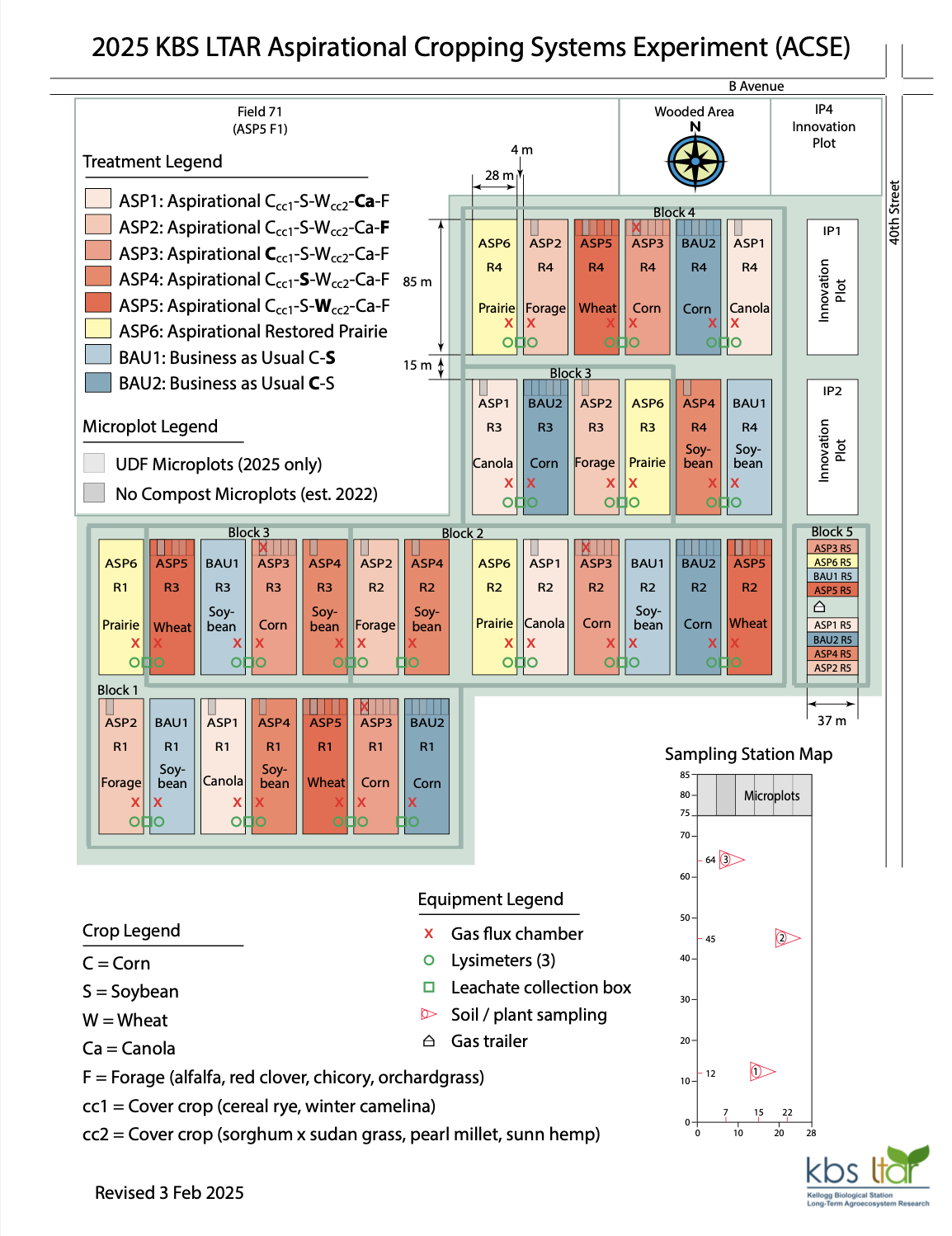Croplands Common Experiment
The LTAR Croplands Common Experiment (CCE) is designed to provide the knowledge needed to sustainably intensify U.S. row crop production. The objectives of the Croplands Common Experiment are to:
- Develop and evaluate production systems that promote the sustainable intensification of cropland agriculture;
- Identify, quantify, and understand mechanisms underlying tradeoffs and synergies among ecosystem services; and
- Use common long-term measurements and observations to understand and model ecosystem service outcomes under future projections of climate variability and change.
The LTAR Common Experiment at all sites compares common agronomic systems and practices (Business-as-Usual) to Aspirational systems and practices that have the potential to achieve sustainable intensification goals. Treatments within the Common Experiment at KBS are slated to begin in 2022 and include a conventionally managed corn-soybean system compared to a more diverse cropping system with livestock integration and conservation practices. The Aspirational treatment is designed to increase productivity, including yields and yield stability profitability; produce positive environmental outcomes related to soil health, climate change, and biodiversity; and promote rural prosperity, including farm and community well-being. See the summary below for a side-by-side comparison of Business-as-Usual to Aspirational treatments.
For more information on the LTAR Common Experiment cross-site research, read this publication.

|
|
Business as Usual |
Aspirational |
|
Crop Rotation |
Corn-Soybean |
Corn-Soybean-Winter Wheat-Winter Canola-Diverse Perennial Forage |
|
Crop Genetics |
High yielding corporate varieties with genetic modifications; fungicide and insecticide seed treatment. |
Corporate and public varieties targeting system suitability with genetic modifications for corn and soybeans; fungicide seed treatment on corn, wheat & canola; insecticide seed treatment on corn only |
|
Planting |
Agronomic optimum flat seeding rates when soil conditions allow starting in mid-April for both crops |
Variable seeding rates based on yield and soil maps; planting dates determined by soil conditions as well as cover crop termination timing |
|
Tillage |
Chisel plow & soil finish |
None |
|
Cover Crops |
None |
Grass & brassica after corn; grass & legume after wheat; legume, grass & forb after canola |
|
Fertility |
Agronomic optimum flat rates of nitrogen; phosphorus and potassium based on soil tests and crop removal; sulfur and micronutrients mixed with nitrogen fertilizer |
Variable rate nitrogen based on MRTN and credits for manure, soil health and legume cover crops; variable rate phosphorus and potassium based on grid soil sampling; banded phosphorus within or near rows; sulfur and micronutrients mixed with nitrogen fertilizer |
|
Pest Management |
Scheduled herbicide, insecticide and fungicide applications |
Integrated pest management utilizing scouting and pest forecasting models |
|
Livestock Integration |
None |
Cover crops harvested for forage; straw harvested for bedding; manure composted and returned to fields prior to corn planting |
|
Conservation Plantings |
None |
Prairie strips planted in low yielding marginal areas of fields |
|
Irrigation or Drainage |
None |
None |
This aspirational cropping system at KBS was developed and is continually refined using a collaborative approach that brings together stakeholders and scientists to define intended outcomes and specific practices.
The LTAR Common Experiment at KBS is called the Aspirational Cropping System Experiment (ACSE). The experimental design includes both fields (to replicate the spatial variability faced by farmers) and plots (to provide the more controlled environments needed for some measurements). The images below provide links to downloadable pdf's of these maps.





 Print
Print Email
Email